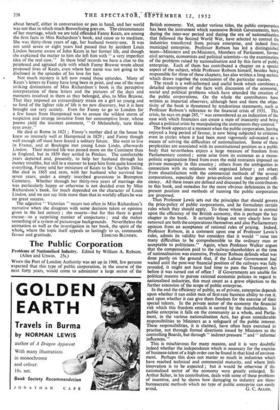The Public Corporation
Problems of Nationalised Industry. Edited by William A. Robson. (Allen and Unwin. 25s.) Problems of Nationalised Industry. Edited by William A. Robson. (Allen and Unwin. 25s.) WHEN the Port of London Authority was set up in 1908, few persons expected that this type of public corporation, in the course of the next forty years, would come to administer a large sector of the British economy. Yet, under various titles, the public corporation has been the instrument which successive British Governments, both during the inter-war period and &Ong the era of nationalisation that followed the Second World War, have selected to control the industries transferred from private enterprise, and indeed from municipal enterprise. Professor Robson has led a distinguished team—Ministers and ex-Ministers, Members of Parliament, former civil servants, economists and political scientists—to the examination of the problems raised by nationalisation and by this form of public enterprise. Each of them has contributed a chapter on a special aspect of the subject, while Professor Robson himself, besides beirg responsible for three of these chapters, has also written a long section which draws together the conclusions of the particular studies.
The result is a well-informed and useful book which combines a detailed description of the facts with discussion of the economic, social and political problems which have attended the creation of the public corporations. On the whole the contributors haw written as impartial observers, although here and there the objec- tivity of the book is threatened by tendentious statements, such as Professor Robson's reference to the financial crisis of 1931. This crisis, he says on page 285, " was remembered as an indication of the ease with which financiers can create a state of insecurity and bring about a political crisis by manipulating the instruments they control." The book appears at a moment when the public corporation, having enjoyed a long period of favour, is now being subjected to'criticism even in circles where it had been most vigorously advocated as a means of solving the difficulties of nationalisation. Some of these perplexities are associated with its constitutional position as a public body that nevertheless enjoys a large measure of freedom from Parliamentary control • some arise from its existence as a mono- polistic organisation freed from even the mild restraints imposed on private monopoly in this country ; others from the ambiguities in connection with its relations with organised labour ; yet others from dissatisfaction with the commercial methods of the several corporations, especially their price-policies and their general effi- ciency. All these issues are defined and discussed by the contributors to this book, and remedies for the more obvious deficiencies in the present position and methods of running the public corporation are proposed.
Thus Professor Lewis sets out the principles that should govern the price-policy of public corporations, and he formulates certain rules which they should apply. To those whose interest is centred upon the efficiency of the British economy, this is perhaps the key chapter in the book. It certainly brings out very clearly how far removed are both the corporations themselves and also Parliamentary opinion from an acceptance of rational rules of pricing. Indeed, Professor Robson, in a comment upon one of Professor Lewis's rules, admits its validity but considers that it would " raise too many difficulties to be comprehensible to the ordinary man or acceptable to politicians." Again, when Professor Walker argues that the compensation paid to the railway-shareholders at the time of nationalisation was excessive, Professor Robson defends what was done partly on the ground that, if the Labour Government had waited until the post-war financial position of the railways was fully revealed, it might not have had time to pass the Transport Act before it was turned out of office 1 If Governments are unable for political reasons to pursue rational economic policies in regard to nationalised industries, this must count as a grave objection to the further extension of the scope of public enterprise.
In the end the efficiency of public, as of private, enterprise depends upon whether it can enlist men of first-rate business ability to run it, and upon whether it can give them freedom for the exercise of their special talents. In the private sector of the economy the financial risk which this freedom entails is carried by the shareholders. In public enterprise it falls on the community as a whole, and Parlia- ment, in the various nationalisation Acts, has given considerable responsibilities to Ministers as a safeguard of the public interest.
These responsibilities, it is claimed, have often been exercised in practice, not through formal directions issued by Ministers to the controlling Boards, but through " indirect pressure " and " informal influences."
This is mischievous for many reasons, and it is very doubtful indeed whether the independence which is necessary for the exercise of business-talent of a high order can be found in that kind of environ- ment. Perhaps this does not matter so much in industries which have reached technical and commercial maturity, and where little innovation is to be expected ; but it would be otherwise if the nationalised sector of the economy were greatly enlarged. Sir Arthur Salter, in his contribution, deals with some of these problems of incentive, and he shows how damaging to industry are those bureaucratic methods which no type of public enterprise can easily


































 Previous page
Previous page